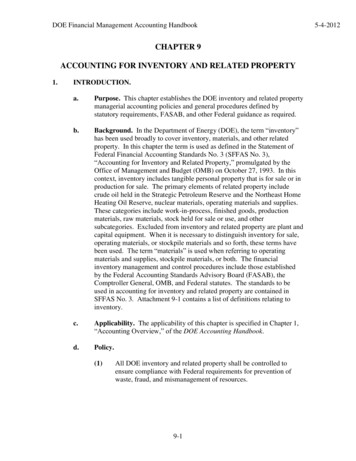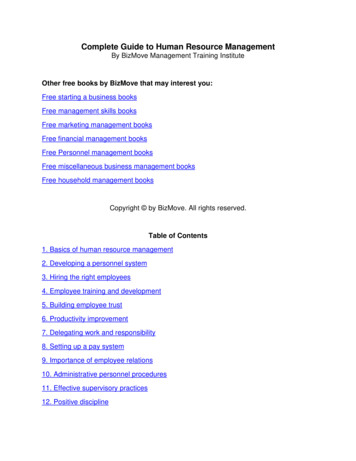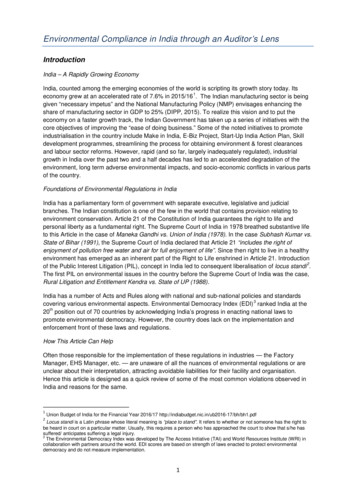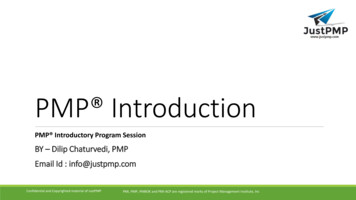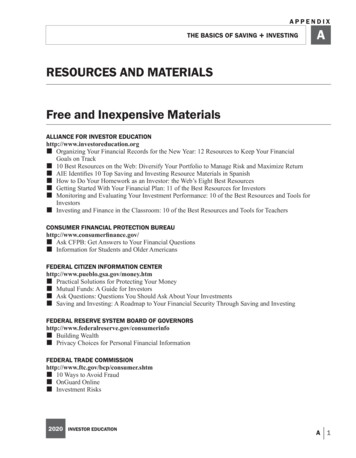
Transcription
APPENDIXTHE BASICS OF SAVING INVESTINGARESOURCES AND MATERIALSFree and Inexpensive MaterialsALLIANCE FOR INVESTOR g Your Financial Records for the New Year: 12 Resources to Keep Your FinancialGoals on Track10 Best Resources on the Web: Diversify Your Portfolio to Manage Risk and Maximize ReturnAIE Identifies 10 Top Saving and Investing Resource Materials in SpanishHow to Do Your Homework as an Investor: the Web’s Eight Best ResourcesGetting Started With Your Financial Plan: 11 of the Best Resources for InvestorsMonitoring and Evaluating Your Investment Performance: 10 of the Best Resources and Tools forInvestorsInvesting and Finance in the Classroom: 10 of the Best Resources and Tools for Teachers CONSUMER FINANCIAL PROTECTION BUREAUhttp://www.consumerfinance.gov/Ask CFPB: Get Answers to Your Financial QuestionsInformation for Students and Older Americans FEDERAL CITIZEN INFORMATION CENTERhttp://www.pueblo.gsa.gov/money.htmPractical Solutions for Protecting Your MoneyMutual Funds: A Guide for InvestorsAsk Questions: Questions You Should Ask About Your InvestmentsSaving and Investing: A Roadmap to Your Financial Security Through Saving and Investing FEDERAL RESERVE SYSTEM BOARD OF oBuilding WealthPrivacy Choices for Personal Financial Information FEDERAL TRADE COMMISSIONhttp://www.ftc.gov/bcp/consumer.shtm10 Ways to Avoid FraudOnGuard OnlineInvestment Risks 2020 INVESTOR EDUCATIONIA 1
APPENDIXATHE BASICS OF SAVING INVESTINGFINANCIAL INDUSTRY REGULATORY AUTHORITY (FINRA)http://www.finra.org/InvestorsSmart Investing: Choosing InvestmentsSmart Investing: Smart Saving for CollegeProtect Yourself: Investor AlertsFINRA BrokerCheck INVESTOR PROTECTION INSTITUTEhttp://www.iInvest.orgDASH for the STASH PostersVideos on Investing BasicsVideos Highlighting Different Types of Investment Fraud INVESTOR PROTECTION TRUSThttp://www.investorprotection.orgFive Keys to Investing SuccessA Primer for Investing in BondsGetting Help With Your InvestmentsWhere to Invest Your College MoneyThe Basics for Investing in StocksMutual Funds and ETFs: Maybe All You’ll Ever NeedMaximize Your Retirement Investments NATIONAL ASSOCIATION OF INVESTORS efault.htmBetterInvesting Investment ClubsUnderstanding the JargonExplaining Fundamental InvestingHow to Compare Stocks NATIONAL FRAUD INFORMATION CENTERhttp://www.fraud.orgBusiness FraudTelemarketing FraudConsumer Resources NORTH AMERICAN SECURITIES ADMINISTRATORS enter/How to Contact Your Securities RegulatorNASAA Fraud NinjaHow to Spot a Con ArtistHow to Avoid Becoming a VictimInvestor ResourcesInvestor Bill of RightsTop 10 Investor Traps IA 2INVESTOR EDUCATION2020
APPENDIXTHE BASICS OF SAVING INVESTINGASECURITIES INVESTMENT ASSOCIATION, FOUNDATION FOR INVESTOR EDUCATIONhttp://www.tomorrowsmoney.orgYoung Adults Starting OutFor Today’s WomanResources in Spanish U.S. SECURITIES AND EXCHANGE COMMISSION, OFFICE OF INVESTOR EDUCATION AND ADVOCACYhttp://www.sec.gov/investorTeachers and StudentsTeacher Care PackageCheck Out Brokers and Investment AdvisersCalculators Periodicals & News Media Web SitesBARRON’Shttp://online.barrons.comBLOOMBERG G www.cnbc.com/FORBEShttp://www.forbes.comFOX TOR’S BUSINESS DAILYhttp://www.investors.comKIPLINGER’S PERSONAL ww.marketwatch.com2020 INVESTOR EDUCATIONIA 3
APPENDIXATHE BASICS OF SAVING INVESTINGMONEY MAGAZINEhttp://money.cnn.comMSN MONEYhttp://www.msn.com/en-us/moneySMART MONEY INTERACTIVEhttp://www.smartmoney.comUS NEWS AND WORLD REPORThttp://www.usnews.comWALL STREET JOURNAL CLASSROOM EDITIONhttp://wsjclassroom.comYAHOO FINANCEhttp://finance.yahoo.comNon-IPT Teaching Guides and ResourcesCase, Karl E., Ray C. Fair and Sharon Oster. Principles of Economics. 11th Ed. Upper Saddle River, N.J.;Prentice Hall. 2013.Garman, Thomas, and Raymond Forgue. Personal Finance. 11th Ed. Boston, MA; Centage Learning. 2011.The Gen i Revolution. A competitive online game to teach personal finance skills to middle and high schoolstudents. The “Murktide,” a confusion about basic personal finance principles, is rapidly spreading acrossthe population, and middle and high school students are the last line of defense against a lifetime of poorfinancial decisions. Council for Economic Education, 122 East 42nd Street, Suite 2600 New York, NY10168. 212-730-7007. 2015 http://www.genirevolution.org/.Financial Literacy Training for High School Students: Asset Allocation and Security Selection.Instructional modules and handouts developed by The Center for Financial Studies at Southern NewHampshire University. The purpose of this module is to present the rudiments of asset allocation andsecurity selection procedures. FINRA Investor Education Foundation, 1735 K Street, NW Washington,D.C. 20006-1506. 2012. ce SS GETPAGE&ssDocName P118403Financial Literacy Training for High School Students: Investing for Retirement. Instructional modulesand handouts developed by The Center for Financial Studies at Southern New Hampshire University.The purpose of this module is to present a method for estimating the need for retirement income, themost common types of retirement savings plans, and the effects of compounding and the relative benefitof establishing a retirement savings plan as early as possible. FINRA Investor Education Foundation,1735 K Street, NW Washington, D.C. 20006-1506. 2010. ce SS GET PAGE&ssDocName P118407IA 4INVESTOR EDUCATION2020
APPENDIXATHE BASICS OF SAVING INVESTINGHigh School Financial Planning Program (HSFPP). Teaching guide, student workbook, PowerPointvisuals, online games, assessments. Applies financial planning process to goal setting, budgeting, credit,saving, investing, financial institutions and careers. National Endowment for Financial Education,5299 DTC Boulevard, Suite 1300, Greenwood Village, CO 80111. 303-741-6333. Free to schools andorganizations. 2015 http://www.nefe.org/home.Investor Education Resources for Adults and Families. Tools for adults and families to develop aninvestment plan, evaluate investment opportunities and promoters, and spot the red flags of fraud. Statesecurities regulators provide valuable resources to help you become a more confident and informedinvestor. North American Securities Administrators Association (NASAA), 750 First Street NE, Suite 1140,Washington, DC 20002. rces-for-adults-andfamilies/Kapoor, Jack, and Jack R., Dlabay, Les and Hughes, Robert. Personal Finance. 10th Ed. Glencoe/Mcgraw-Hill. 2011.Miller, Roger LeRoy. Glencoe Economics Today & Tomorrow. Westerville; McGraw-Hill. 2008.Miller, Roger L. and Alan D. Stafford. Economic Education for Consumers. Cincinnati; South-WesternEducational Publishing. 2010.Ryan, Joan S. Managing Your Personal Finances. 6th ed. Cincinnati; South-Western Educational Publishing. 2010.What Older Adults Need to Know About Money. Covers catch-up retirement-planning strategies, decisionsabout the timing and location of one’s retirement, receipt and possible taxation of Social Security benefits,pension plan distribution decisions, required distributions from retirement savings plan, and more.New Jersey Coalition for Financial Education (NJCFE), 308 West State St., Trenton, NJ 08618. lts-money-advice.pdf2020 INVESTOR EDUCATIONIA 5
APPENDIXATHE BASICS OF SAVING INVESTINGOrganizations and AssociationsAMERICAN ASSOCIATION OF INDIVIDUAL INVESTORS800-428-2244 http://www.aaii.comCERTIFIED FINANCIAL PLANNERS BOARD OF STANDARDS800-487-1497 http://www.cfp.netCONSUMER FINANCIAL PROTECTION BUREAU(855) 411-CFPB (2372) http://www.consumerfinance.gov/FEDERAL TRADE COMMISSIONToll-free 1-877-FTC-HELP (382-4357) http://www.ftc.govFINANCIAL INDUSTRY REGULATORY AUTHORITY (FINRA)301-590-6500 http://www.finra.orgINVESTOR PROTECTION INSTITUTE202-775-2111 http://www.iInvest.orgINVESTOR PROTECTION TRUST202-775-2111 http://www.investorprotection.orgJUMP TART COALITION FOR PERSONAL FINANCIAL LITERACY888-45-EDUCATE http://www.jumpstartcoalition.orgNATIONAL FUTURES ASSOCIATION (NFA)800-621-3570 http://www.nfa.futures.orgNATIONAL ASSOCIATION OF INVESTORS CORPORATION877-275-6242 http://www.better-investing.orgNATIONAL ASSOCIATION OF PERSONAL FINANCIAL ADVISORS (NAPFA)847-483-5400 http://www.napfa.orgNORTH AMERICAN SECURITIES ADMINISTRATORS ASSOCIATION202-737-0900 http://www.nasaa.orgSECURITIES INDUSTRY AND FINANCIAL MARKETS ASSOCIATION212-313-1200 http://www.sifma.orgU.S. SECURITIES AND EXCHANGE COMMISSIONToll-free 1-800-SEC-0330 (732-0330) http://www.sec.govIA 6INVESTOR EDUCATION2020
APPENDIXTHE BASICS OF SAVING INVESTINGAGlossary of Terms12(b)-1 FEES — Ongoing fees that cover the costs of marketing, maintaining, and managing a mutual fund.401(k) PLAN — A tax-deferred, employment-based retirement savings plan that allows an employer to matchemployee deposits into the account up to 100 percent.403(b) PLAN — A tax-deferred employment-based retirement savings plan for government and non-profitemployees that allows an employer to match employee deposits in the account up to 100 percent.AFFINITY FRAUD — A type of investment scheme that preys upon members of identifiable groups based onthings such as race, age, religion, etc.AGGRESSIVE GROWTH SECURITIES — Stocks, bonds, and mutual funds having capital growth as theirmain objective.ANNUAL PERCENTAGE RATE (APR) — Yearly interest rate charged on a credit account.ANNUITY — An investment product that pays a specified income payable at various intervals for a fixedperiod of time.APPRECIATION — An increase in the value of an asset over time.ASSET — An item owned by an individual or organization that has monetary value.ASSET ALLOCATION — Strategy for selecting various investment vehicles in order to spread risk amongstocks, bonds and cash equivalents.BENEFITS — Positive outcomes that result from a choice or decision.BLUE CHIP COMPANIES — Common name for companies with a long history of trustworthy accounting,favorable returns and growth.BLUE SKY LAWS — State laws that govern the offer and sale of securities to residents of that state.BOILER ROOM — A slang term for the calling center used by telemarketers because it is where swindlers“turn up the heat” on their potential victimsBOND — A certificate representing a loan of money for a specific period in exchange for a promise to repaythe amount borrowed with interest by the government or a corporation.BORROWER — An individual who uses another person’s money for current use with a promise to repay thatamount from future income or earnings.CAPITAL GAINS — The increased value at the time of redemption of a security since its original purchase.CAPITALIZATION — The overall value of shares of a company’s stock.CAPITAL LOSS — The decreased value at the time of redemption of a security from its original purchase.2020 INVESTOR EDUCATIONIA 7
APPENDIXATHE BASICS OF SAVING INVESTINGCASH ADVANCE — Cash received on a credit line at a high interest rate.CAVEAT EMPTOR — Latin phrase meaning “Let the buyer beware.”CENTRAL REGISTRATION DEPOSITORY (CRD) — The database of FINRA-registered stockbrokerscontaining their work and disciplinary history.CERTIFICATE OF DEPOSIT (CD) — A saving tool purchased for a specific dollar amount at a fixedinterest rate for a specific time period.CHOICES — Possible alternatives or options; the best option under a given circumstance.COLLECTIBLES — Physical objects such as fine art, stamps and antiques that are purchased as aninvestment.COMMAND ECONOMY — An economic system in which all decisions concerning production of goods andservices are made by the government and all resources are owned by the government.COMMISSION — The fee paid to a broker or agent fee for carrying out a transaction.COMMODITY FUTURES TRADING COMMISSION — The regulatory organization for futurescontracts and commodities.COMMON STOCK — The securities representing equity ownership in a public company.COMPOUND INTEREST — The interest earned on principal plus previously accrued interest.CONSUMER — An individual who buys or uses products or resources.COSTS (DECISION MAKING) — Negative outcomes that result from a decision.COUPON RATE — The declared interest rate of a bond.CREDIT — Borrowing money now with a promise to pay it back at a later time, generally with interest.CRITICAL-THINKING SKILLS — Making clear, reasoned judgement through reasoned and well thoughtout processes.DECISION — A choice made from available options.DECISION-MAKING — The process used to determine the best possible choice at a given time based onavailable information and resources.DEMAND — The quantity of goods consumers purchase in a given time period.DISCOUNT BROKER — A financial professional who executes securities transactions with little or noindividual advice and therefore charges a low commission.DIVERSIFICATION — A strategy for reducing risk by spreading investment money among a number ofinvestment types and industries.DIVIDEND — The earnings on stock paid to shareholders by corporations.DIVIDEND REINVESTMENT PLAN — The reinvestment of your stock dividends into the purchase ofadditional shares of that company’s stock.IA 8INVESTOR EDUCATION2020
APPENDIXTHE BASICS OF SAVING INVESTINGADOLLAR-COST AVERAGING — The Investment of the same fixed-dollar amount in the same investmentvehicle at regular intervals over a long period of time regardless of price.DOW JONES INDUSTRIAL AVERAGE (DJIA) — A market indicator that averages blue chip U.S. stocksin different categories.ECONOMIC GROWTH — A time of general rise in a region’s economy. During economic growth, moregoods and services are produced, more jobs are created, and income levels rise.ECONOMIC INDICATORS — Regularly reported statistics that evaluate business conditions and economictrends. Some of these statistics include employment, stock prices, money supply, and consumer confidence.ECONOMICS — The study of management, distribution, and consumption of goods and services.ECONOMY — A system of regulations and rules by which a country’s production and consumption activitiesare managed.EMPLOYER-SPONSORED RETIREMENT PLAN — A saving/investment plan approved by the InternalRevenue Service (IRS) that allows an individual to place funds in a tax-sheltered account for the purpose offunding all, or part, of one’s retirement.ENTREPRENEUR — An individual who establishes, maintains, and assumes the risk of a business operation.ETHICS — The beliefs that govern an individual or community’s actions.EXCHANGE — The central location where buyers and sellers unite to execute transactions.EXCHANGE-TRADED FUND (ETF) — A marketable security that tracks an index, a commodity, bonds, ora basket of assets. Unlike mutual funds, an ETF trades like a common stock on a stock exchange.EXPENSE — An outflow of money.FDIC (FEDERAL DEPOSIT INSURANCE CORPORATION) — An agency of the federal governmentcreated to guarantee bank deposits.FEDERAL RESERVE SYSTEM (FED) — The central banking system of the U.S. that sets forth economicpolicies affecting the nation as a whole. The Fed maintains accounts for government agencies, regulates thebuying and selling of government securities, lends money to banks, monitors and audits banks, controls thecirculation of money, and many other tasks.FINANCIAL ADVISER — A professional who provides financial information and advice; may includean employee benefits staff member, credit counselor, bank employee, broker, financial planner, accountant,insurance agent, or attorney.FINANCIAL INDUSTRY REGULATORY AUTHORITY (FINRA) — A self-regulatory organization thatoperates and regulates the Nasdaq Stock Market and oversees the activities of the U.S. broker-dealer profession.FINANCIAL INSTITUTION — An entity that provides financial services. The term usually refers to banks,credit unions, brokerage houses, and savings and loan institutions.FINANCIAL MARKET — Markets consisting of exchanges that serve as a central location where buyersand sellers get together in person, by telephone, or by computer terminal to trade stocks, bonds, commodities,options, futures contracts, and other securities.2020 INVESTOR EDUCATIONIA 9
APPENDIXATHE BASICS OF SAVING INVESTINGFINANCIAL PLAN — A systematic course of action for identifying financial goals, figuring net worth,estimating income and expenses, and using credit wisely.FRAUD — The use of intentional misrepresentation for illegal gain.FREE ENTERPRISE SYSTEM — An economic system that allows anyone to start a business provided theyhave the resources to do so.FUTURES — A contract to buy or sell a specific amount of a commodity at a specific future date and price.GOAL — An end result toward which effort is directed. Financial goals can be short-range (within a year);medium-range (one to five years); or long-range (more than five years).GOVERNMENT SECURITIES — Securities offered and insured by the federal government, includingtreasury bills, notes and bonds.GROSS DOMESTIC PRODUCT (GDP) — A macroeconomic indicator that calculates the value of goodsand services produced throughout a nation.HIGH QUALITY CORPORATE SECURITIES — Stocks, bonds, and mutual funds that are issued bycompanies with a long history of favorable returns and growth.INCENTIVE — Rewards or penalties encouraging choices that help consumers reach their financial and nonfinancial goals.INCOME — Payment received as a result of investments, interest, or work.INDIVIDUAL RETIREMENT ACCOUNT (IRA) — Savings plans of which there are several differenttypes of Individual Retirement Accounts allowed by the IRS to promote retirement savings that provide taxadvantages and increase the effect of compound interest.INFLATION — A general rise in prices of goods and services that reduces the purchasing power of money.INSURANCE — A risk management tool that protects an individual from financial loss, generally in the formof a policy with premium and/or deductible payments.INTEREST — The cost of borrowing and lending money as follows: 1. Payment received by an investor froma financial institution as a result of an investment or savings; 2. A percentage of the loan amount borrowed by aconsumer paid back to the lender.INTEREST RATE — A percentage of the principal amount that serves as the cost of using that money.INVESTING — Money spent to increase current and/or future income; it is not insured against loss and it risesand falls with the investment market.INVESTMENT ADVISER — A professional who provides financial information and advice specific to one’sinvestments and financial goals.INVESTMENT OBJECTIVES (MUTUAL FUND) — Objectives categorized by the type of investmentsthat comprise the fund (i.e. Stock Mutual Fund, Aggressive Growth Mutual Fund, Balanced Mutual Fund orGrowth and Income, Bond Mutual Fund, Equity Fund or Income Fund).IA 10INVESTOR EDUCATION2020
APPENDIXATHE BASICS OF SAVING INVESTINGINVESTMENT PLAN — A roadmap for individuals who invest in the markets. Investment plans shouldmaximize earnings to reach one’s financial goals while protecting their capital.LAW OF DEMAND — An economic governing principle that suggests that an inverse relationship existsbetween demand and cost of a product or service.LAW OF SUPPLY — An economic governing principle that suggests that as costs increase, the quantitysupplied to buyers also rises.LENDER — An individual, organization, or company that extends credit to a borrower with the expectationthat the amount will be paid back over time.LIABILITY/LIABILITIES — The dollar value of debts owed to others.LIMITED RESOURCES — A term indicating that one’s resources may not be enough to satisfy all needs andwants.LIQUIDITY — The ease with which an investment can be converted into cash without a loss to principal.LOAD FUND — A mutual fund that charges a sales commission (load).LOAN PERIOD — The time frame in which a loan must be repaid, usually stated in years.LONG-TERM GOAL — A goal that will take more than five years to achieve.MACROECONOMICS — The study of the economy-at-large including overall income, growth, inflation,and employment rates.MANAGEMENT FEES — Fees charged to mutual fund investors covering the maintenance and marketingcosts of that fund.MARKETS — A meeting place for buyers and sellers to exchange goods and services.MARKET CAPITALIZATION — The overall value of all shares of a publicly-traded company’s stock.MARKET ECONOMY — An economic system where people own and operate businesses.MARKET RETURNS — The increase or decrease of one’s investment portfolio.MARKET VOLATILITY — Fluctuations in the price and value of securities that result in gains and losses ofcapital.MATCHING (CONTRIBUTION) — The dollar for dollar amount an employer will contribute to one’sretirement plan when the employee contributes.MEDIUM-TERM GOAL — A goal that will take one to five years to achieve.MICROECONOMICS — The study of small components of a regional, national, or global economy.Components may include individuals, households, or businesses.MINIMUM MONTHLY PAYMENT — The smallest amount of money accepted by the creditor each billingcycle to keep an account in good standing.2020 INVESTOR EDUCATIONIA 11
APPENDIXATHE BASICS OF SAVING INVESTINGMIRROR TRADING —An automated trading platform for investors where a knowledgeable third partyexecutes a trade in his or her account, and the same trade is mechanically placed on behalf of the investor.Investors should recognize that unscrupulous traders may use trendy platforms such as mirror trading as a wayto launch schemes.MISCELLANEOUS FEES (CREDIT ACCOUNTS) — The additional fees charged a borrower for use ofcredit including late fees, annual fees, over-the-limit fees, bounced check fees, etc.MONETARY POLICY — The national policy set forth by the Federal Reserve System that affects all aspectsof money, including the availability of money and the cost of credit.MONEY MARKET MUTUAL FUND — A low risk mutual fund that invests in stable, short-term securities.MUTUAL FUND — An investment tool that pools the money of shareholders in a diversified portfolio ofsecurities.NATIONAL ASSOCIATION OF SECURITIES DEALERS AUTOMATED QUOTATION (NASDAQ)— A computerized system that allows brokers to trade stocks electronically.NATIONAL CREDIT UNION ASSOCIATION (NCUA) — A federal government agency created toguarantee credit union deposits.NEED — Those things that are essential to human existence.NET ASSET VALUE (NAV) — The current market value of a mutual fund’s portfolio divided by the numberof shares equals NAV/share. (The NAV is calculated at least one time every business day.)NET WORTH — A person’s financial condition at a given time. Assets (things owned) minus liabilities (thingsowed) equals net worth.NEW YORK STOCK EXCHANGE (NYSE) — The oldest stock market in the United States overseeingdaily trading in more than 2,000 stocks involving millions of shares.NO-LOAD FUND (NL) — A mutual fund purchased directly from the fund with no sales charge.NORTH AMERICAN SECURITIES ADMINISTRATORS ASSOCIATION (NASAA) — A tradegroup for state securities agencies that regulate financial offerings in each state and protect consumers frominvestment fraud.ONLINE FRAUD — The use of Internet services or social media to defraud victims or to otherwise takeadvantage of them.OPPORTUNITY COST — The next most valued alternatives that will be given up as a result of choosinganother option.PAY YOURSELF FIRST — A practice that establishes an amount to be saved each payday and put intosavings or invested first before other spending takes place.PENNY STOCK — A stock that trades at a relatively low price and market capitalization and are generallyconsidered to be highly speculative and high risk.PHISHING — A scam by which an e-mail user is duped into revealing personal or confidential informationwhich the scammer can use illicitlyIA 12INVESTOR EDUCATION2020
APPENDIXATHE BASICS OF SAVING INVESTINGPONZI SCHEME — An illegal investment scam named for its inventor, Charles Ponzi, that uses new investormoney to pay previous investors.PORTFOLIO — A collection of investments held by an individual or organization.PRECIOUS METALS — Gold bullion, silver and other minerals of value that are treated as investments.PREFERRED STOCK — A more expensive share of a company that provides dividends to its shareholdersand provides rights to the company’s assets before holders of common stock.PRICE — The monetary value at which a good or service is bought or sold.PRINCIPAL — The amount of your initial investment or funds put into savings.PRIVATE COMPANY — A company owned exclusively by an individual, family, or small group of people.PROSPECTUS — A legal document issued by public companies and mutual funds detailing informationrelevant to investment decisions.PUBLIC COMPANY — A corporation that sells shares of ownership to the general public.PYRAMID SCHEME — An illegal investment scam whereby investors are asked to recruit others withpromises of high returns and a share of the investments made by the people they recruit.RAINY DAY FUND — Liquid assets that are saved and readily available in the event of emergency.REAL ESTATE — Physical property owned for the purpose of investment, including rental property, personalproperty, or business property.RETURN — The total increase or decrease of an investment; includes income plus capital gains or minuscapital losses.RISK (INVESTMENT) — The possibility that an investment will lose value.RISK/RETURN RELATIONSHIP — The assumption that greater uncertainty equates to higher gain and thatless uncertainty equates to lower gain on an investment.RISK TOLERANCE — The degree of risk that an individual can afford to take or is comfortable taking wheninvesting.ROLE OF GOVERNMENT — The parameters established for the government to take action and intervenefor the common good of its citizens.RULE OF 72 — A mathematical process by which individuals can determine the number of years it will taketo double their money if the interest rate is known.SAVINGS — Income withheld from current spending for future use.SAVINGS ACCOUNT — An account used to set aside income for easy withdrawal and to accrue interest.SCARCITY, SCARCE — A condition in which resources are insufficient to fulfill consumer wants.SECURITIES AND EXCHANGE COMMISSION (SEC) — An independent federal agency that governsthe securities industry and enforces securities laws.2020 INVESTOR EDUCATIONIA 13
APPENDIXATHE BASICS OF SAVING INVESTINGSECURITY — A tradable financial asset of any kind.SHORT-TERM GOAL — A goal that will be achieved within one year.SIMPLE INTEREST — A percentage of the principal amount only.SECURITIES INVESTOR PROTECTION CORPORATION (SIPC) – A Congressionally-chartedorganization that acts as trustee or works with an independent court-appointed trustee to recover assets ofcustomers if a brokerage firm goes out of business.STATE SECURITIES REGULATOR — A government officer who handles the licensing, registration, andregulation of stockbrokers and financial advisors that do business in a specified state.STOCK — An investment that represents shares of ownership in a company.STOCKBROKER — A financial representative who handles the buying and selling of securities.STOCK MARKET — The market in which sellers of stock trade shares with buyers of stock.STOCK SWINDLES — When a scammer hypes a small, little-known company in order to drive up marketvalue, and then dump their stock onto the market and make off with major profitsSTOCK SYMBOL — A group of letters standing for a particular stock, mutual fund, or other security. Alsocalled a ticker symbol or stock abbreviation.SUPPLY — The amount of products or services that a producer is able to make available to consumers at agiven time.SWINDLER — An individual who engages in fraudulent practices for illegal gain.TAX-DEFERRED — Deposits made with pre-tax dollars to accounts that are taxed upon withdrawal.TAX-EXEMPT — Status of being completely or partially immune from taxes.TELEMARKETING FRAUD — Fraud conducted by telephone. Sales calls from unknown persons shouldalways be thoroughly researched before investing.TIME VALUE OF MONEY — The concept that an initial investment made early in life will accrue moreinterest than a series of deposits made later in life (due to compounding, time, rate of interest and amountinvested).TRADE-OFF — Something that is lost by choosing one option over another.TRANSACTION COSTS (INVESTMENT) — The fee charged by a broker to buy or sell investmentproducts.VALUES — Concepts important to an individual that provide a foundation upon which decisions are made.WANTS — Things that are not necessary for sustaining life but that make one’s life more comfortable.IA 14INVESTOR EDUCATION2020
contracts and commodities. COMMON STOCK — The securities representing equity ownership in a public company. COMPOUND INTEREST — The interest earned on principal plus previously accrued interest. CONSUMER — An individual who buys or uses products or resources. COSTS (DECISION



